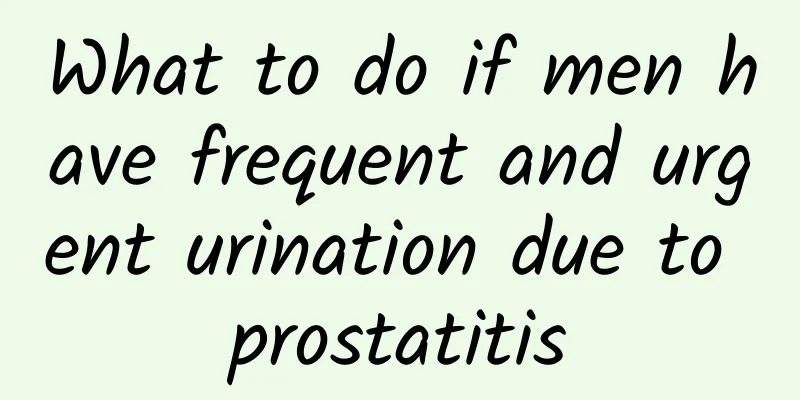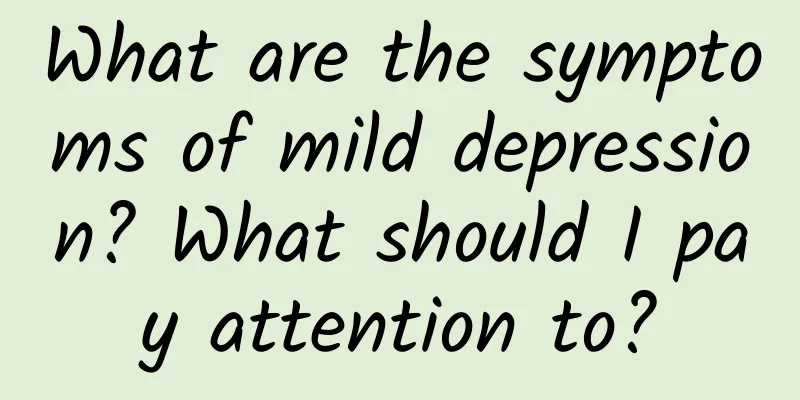What to do if men have frequent and urgent urination due to prostatitis

|
In our daily life, many men always have long-term bad living habits, which will lead to prostatitis. Sometimes it will also lead to frequent urination and urgency. This will always affect our physical health and normal life. If we don’t live in time, it will even easily lead to symptoms of urinary incontinence. Therefore, we must master the treatment methods. Let’s learn about what to do if men with prostatitis have frequent urination and urgency. What to do if men have frequent and urgent urination due to prostatitis 1. Antimicrobial therapy The discovery of pathogenic pathogens in prostatic fluid culture is the basis for selecting antibacterial drug treatment. If patients with non-bacterial prostatitis have signs of bacterial infection and general treatment is ineffective, they can also be appropriately treated with antibacterial drugs. When choosing antibacterial drugs, it is necessary to pay attention to the presence of a prostate-blood barrier composed of lipid membranes between the prostate acini and the microcirculation, which hinders the passage of water-soluble antibiotics and greatly reduces the therapeutic effect. When prostate stones are present, the stones can become a shelter for bacteria. The above factors constitute the difficulty in the treatment of chronic bacterial prostatitis, which requires a longer course of treatment and is prone to recurrence. Currently, quinolone drugs such as ofloxacin or levofloxacin are recommended. If ineffective, continue to use it for 8 weeks. If recurrence occurs and the bacterial species remains unchanged, switch to preventive doses to reduce acute attacks and relieve symptoms. If long-term use of antibiotics induces serious side effects, such as pseudomembranous colitis, diarrhea, and the growth of intestinal resistant strains, the treatment plan needs to be changed. Whether non-bacterial prostatitis is suitable for treatment with antibacterial drugs is still controversial in the clinic. Patients with "aseptic" prostatitis can also use drugs that are effective against bacteria and mycoplasmas, such as quinolones, SMZ-TMP or TMP alone, used in combination with tetracycline and quinolones or used intermittently. If antibiotic treatment is ineffective and it is confirmed to be aseptic prostatitis, antibiotic treatment should be discontinued. In addition, using a double balloon catheter to block the prostatic urethra and injecting antibiotic solution from the urethral cavity back into the prostatic duct can also achieve the purpose of treatment. Type I is mainly treated with broad-spectrum antibiotics, symptomatic treatment and supportive treatment. Type II is recommended to be treated with oral antibiotics, and sensitive drugs are selected. The course of treatment is 4-6 weeks, during which the patient should be evaluated for the efficacy. Type III can first take oral antibiotics for 2 to 4 weeks and then evaluate the efficacy. At the same time, non-steroidal anti-inflammatory drugs, α-receptor antagonists, M-receptor antagonists, etc. are used to improve urination symptoms and pain. Type IV does not require treatment. 2. Anti-inflammatory and analgesic drugs Nonsteroidal anti-inflammatory drugs can improve symptoms. Generally, indomethacin is taken orally or in suppositories. Chinese medicine also has certain effects in using anti-inflammatory, heat-clearing, detoxifying, and hardness-softening drugs. Allopurinol can reduce the concentration of uric acid in the whole body and prostatic fluid. Theoretically, as a free radical scavenger, it can also remove active oxygen components, reduce inflammation, and relieve pain. It is an optional auxiliary treatment method. 3. Physical therapy Prostate massage can empty the concentrated secretions in the prostate duct and drain the infection focus in the obstructed area of the gland. Therefore, for stubborn cases, prostate massage can be performed every 3 to 7 days while using antibiotics. A variety of physical factors are used for prostate physiotherapy, such as microwave, radio frequency, ultrashort wave, medium wave and hot water sitz bath, which are beneficial for relaxing the prostate, posterior urethral smooth muscle and pelvic floor muscle, enhancing antibacterial efficacy and relieving pain symptoms. The above is an introduction to what to do if men with prostatitis have frequent urination and urgency. If such symptoms occur, you must go to a regular specialist hospital for examination. In addition, male friends must pay attention to keeping their bodies warm, pay attention to nutritional balance in their diet, and eat less raw, cold, and irritating foods. |
<<: What causes scrotal heat and itching?
>>: What is the cause of itching on both sides of the scrotum?
Recommend
Are you using the right sunscreen? There is a big difference between sunscreen and sun cream
There are many types of sunscreen products. Which...
What are the symptoms of testicular hernia?
I believe everyone knows the condition of hernia ...
Is it good for men to drink more royal jelly?
Royal jelly has great benefits for the human body...
How can men nourish their kidneys?
Who knows that nowadays, as many men are getting ...
How should men eat when they are afraid of cold?
Fear of cold is a very common physiological condi...
Three things men must do after sex
After a short break from sex, the first thing to ...
What is the cause of the pain in the testicles?
The testicles are an essential organ of the male ...
Prostate Exercise Methods Pictures
Today's life is fast-paced, material conditio...
How to control sexual desire, methods to control sexual desire
Sexual desire is a normal physiological desire th...
Black spots on man's face
It is not uncommon to have spots on the face. Man...
Elderly people should pay attention to these matters when bathing
In daily life, for the sake of their own health, ...
What are the harms of smoking to sperm?
There are many harms of smoking. For example, as ...
10 ways to boost sperm count in men
Data shows that the quality of Chinese men's ...
Men can nourish their livers by lying on their sides every night
In daily life, men pay more and more attention to...
The part of a man that needs the most care
All men are concerned about their "face"...









